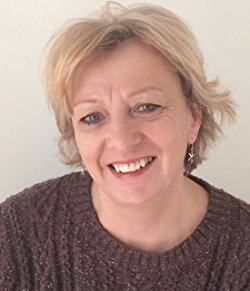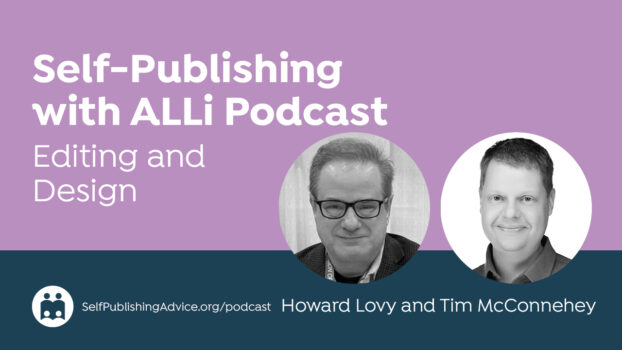
Indie author Janet Pwyell shares her joy at being employed to teach on a publishing course – as a self-published author
Every Sunday here on the ALLi blog, we celebrate a self-publishing success story. Often these are interviews with high-achieving indie authors to provide role models , but we also herald other kinds of success, particularly when it ties in as neatly as Janet Pywell‘s account today with ALLi campaigns. As regular readers and ALLi members will know, we have long been advocating equal opportunities for indie authors in our “Open up to Indies” campaign (#publishingopenup), so we were thrilled to hear of Janet's appointment as part of the academic team teaching a publishing course at an English university.
I previously worked with Canterbury Christchurch University (CCCU) students to develop my social media platform and launched Book of Hours, Book 2, in my Culture Crime Series at the University bookshop. Then last summer I was invited by writer Professor Carolyn Oulton, Subject Lead Creative and Professional Writing at Canterbury Christchurch University (CCCU) in Kent, England, to teach second year students on Professional Practice I.
Why Appoint an Indie Author?
Carolyn told me that as a self-published author, I can demystify the process of self-publishing:
“Some of them (the students) may think it's all about signing up with a huge publisher, and of course it's not that simple. Nor is it necessarily the best option. It's good for them to see just how many skills are needed in addition to writing, whether they want to go down this route themselves or develop skills for a publishing career.”
I was delighted and felt it was an achievement to teach at CCCU, not just for me but as a representation for all indie authors to be accepted, recognised and respected by academia.

Janet Pwyell is now teaching at Christchurch Canterbury University
What I'm Teaching
The Professional Practice 1 module aims to provide students with knowledge and understanding of contemporary professional practice across a variety of industries. Having been director of my own marketing company for ten years prior to becoming a full-time author with experience of writing non-fiction, I was confident I had a wealth of experience I could share with students.
On the course, students examine and engage with the media industry. In particular, the course enables students to understand and practice styles, techniques and professional practice required to write and edit non-fiction articles and features suitable for the newspaper and magazine market as well as internet opportunities.
These are all skills that self-published authors use regularly to publish their books; writing press releases for TV and radio, blog posts, submissions, pitching to agents or editors, generating newsletters for regular readers – the list is pretty endless.
Also on the course, students are introduced to the skills and basic understanding of persuasive writing required for the advertising and copywriting industry. So, I’ve been reading the coursework books, such as You Talking to Me (Rhetoric from Aristotle to Obama) and Wynford Hicks' Writing for Journalists, that otherwise may not have been on my reading list. They have helped refresh my thoughts and ideas and have allowed me to expand my own ideas and learning processes.

Janet Pwyell's self-published books, against their exotic backdrop
What an Indie Author Brings to the Classroom
As a self-published author with authentic and current information, I’m able to share my writing and publishing experiences to help students:
- understand the complete publishing process
- see the bigger picture
- think more deeply about the whole process from writing to editing, marketing and publicity
A traditionally-published author with an agent would potentially have far less of a sense of the context in which their work is published. My job is to educate students and to equip them with the knowledge of how non-fiction writing is influential globally.
How Hard is it to Teach Them?
Is writing a novel harder than planning a teaching semester?
With a book or short story there’s the introduction of characters — the hero and antihero (keeping it simple), then there’s the goal or ambition that creates the story, conflict where things going wrong, followed by a resolution.
With planning lectures there’s the introduction (the aim of the lecture) and what will be discussed, the aims and ambition of the tutorial and problems to overcome, followed by a summary of what’s happened.
See the pattern?
Working with students is like engaging with readers. You have to build on basic qualities and strengths: Engagement. Enjoyment. Knowledge.
It’s imperative to tap into their passion and enthusiasm, as well as guide them toward a career path or route that suits them.
With students we discuss, debate and study examples of our weekly non-fiction writing assignments uploaded to their personal blogs, websites and Medium.
Recently, we looked at submission letters to agents/editors/publicists and analysed two different types. The feedback concluded that these examples were extremely helpful in gaining understanding of the significance of pitching the right article to the right agent and adopting the appropriate tone.
Each week I speak to students individually about their work, aims and assignments. They’re encouraged to find their voice and create their own public image. Many have websites and are already blogging on a range of topics. Some already have readers and followers. Good writing and excellent content is imperative. Others are taking this course as a stepping-stone to create stories for online games or designing comic strips.
The important point is that it helps each student on their own journey.
Their assignments each week are posted to Medium: https://medium.com/clippings-autumn-2018
The regular practice of writing, editing and publishing a weekly article is evidence of their commitment and development of their writing skills for future employers. They also develop confidence, get over criticism, learn to critique with etiquette and polish their work to make it a professional piece of journalism that they can submit as a feature article to mainstream press.
What I'm Gaining from the Post
Teaching at CCCU is paid employment one morning a week for one semester. This is obviously financial compensation for my time, but the reward for me is far greater than money. It’s a journey of discovery, expectation and surprise. It’s a leaning experience for us all, and I tell them honestly that I don’t have all the answers in this ever-changing world of self-publication and social media. I can only show them what works for me, but I can also point them in the right direction to find the solution or answers they need and hope, like all good teachers, that one day their work will far exceed my own.
It’s all about options, choices, and learning new skills, and I can only motivate and encourage their natural passion and talent in this forever-changing world.
A good news story for #publishingopenup: @JanPywellAuthor describes how as an indie author she's been invited to teach a university #publishing course because of her #selfpublishing experience Share on XOTHER SELF-PUBLISHING SUCCESS STORIES
From the ALLi Author Advice Center Archive




Thank you for sharing your story with us! It’s gets a writer to thinking of some of the other ways to share the journey of learning to publish. Excellent job in putting your skills to multiple tasks!